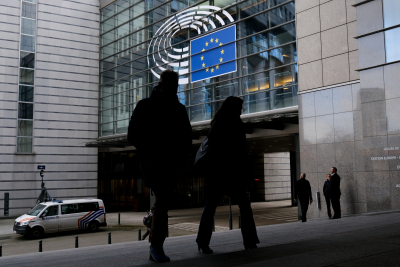This Wednesday sees L’Affaire Barroso reach a climax when the College of European Commissioners, some of whom were his former colleagues, decide whether to sanction or absolve the former President for his decision to join Goldman Sachs as a non-executive Chairman. There is more at stake in this judgement than Barroso’s pension entitlements and his political legacy. The reputation of the European Union itself is at risk.
In making this decision, the Commissioners will be guided by the recommendations of the Commission’s own ethical committee. In two separate sessions in recent weeks, a trio of eminences grises hand-picked by President Juncker have wrestled with the question of whether his predecessor had broken the rules laid down in the EU treaties for former Commissioners to behave with ‘integrity and discretion’ after they have left office.
In this respect, the Commission deserves praise. In previous incarnations, the deliberations of the ethics committee were shrouded in the kind of secrecy reserved for papal elections and Nobel committees. Now, for the first time, the recommendations and reasoning of the committee have been published for anyone to inspect ahead of a College decision, setting an important precedent for future meetings.
While many will be disappointed with the Committee’s ultimate conclusion that Barroso is not guilty of breaching any legal obligations, the document is well worth a closer look. It retains a scrupulous and diplomatic adherence to its narrow terms of reference while conveying its utter distaste for what Barroso has done. In their words, “he has not shown the considerate judgment one may expect from someone having held the high office he occupied for so many years” and “should have been aware…he would give rise to criticism and risk…reputational damage to the Commission and the Union more generally”. The image of a committee collectively holding its nose comes to mind.
It is unlikely that the Commissioners will overturn the recommendation of ethical committee and decide to impose serious penalties. As an institution that is run by lawyers and concerned with upholding the rule of law, it will be satisfied with the narrow legal arguments presented to it that no further action is required. That is probably as it should be, but it ignores two central points that the committee explicitly declared to be beyond its remit.
Firstly, the committee makes no judgement on whether the current rules that limit the discretion of Commissioners in accepting jobs after their term of office has expired are adequate or not. The current 18-month “cooling off period” when former Commissioners are forbidden from lobbying and have to request authorization to take private sector jobs is manifestly inadequate.
To his credit, President Juncker has acknowledged this by announcing in the pages of this paper that he will extend the cooling off period to three years, which, incidentally, is the duration of the ‘transition allowance’ that is paid by the European taxpayer, amounting to up to 60% of a Commissioner’s salary. It also does not assess whether Commissioners being judge and jury in cases involving predecessors and former colleagues is an edifying one. In Norway and Canada, these decisions are made by a fully independent body. The Commission’s hands may be tied now, but it should strengthen the rules to prevent even worse reputational damage tomorrow.
Secondly, while lackluster ethics or poor judgement may not be an issue for tomorrow’s College decision, it is increasingly is issue in the political arena. The fall from grace of the political class heralded by the Brexit vote and Donald Trump’s victory is in part due to the conviction held by large swathes of people that their values are not the values of those who aspire to govern them. Whether this is true or not, the actions of a figure such as Barroso make it harder for every hardworking and dedicated politician to convince the electorate that holding public office is not simply an audition for a lucrative private sector job. It will used as a recruiting tool by eurosceptics across the continent and indeed, as the ethical committee notes, “the damage has already been done”.
Instead of being dismayed by the Committee’s conclusions, we should recognise we are dealing with shifting social norms and, in such cases, social sanctions might be a more appropriate response. By ‘social sanctions’ I mean the ability of civil society more broadly to sanction behaviour that is considered to have violated social norms and expectations. In concrete terms, if concerned citizens believe that Barroso’s behaviour has irreparably damaged the European project, they should think twice about offering that speaking engagement, that honorary degree, that board position. Indeed, by stripping Barroso of the protocol privileges and red-carpet treatment that is normally accorded former Presidents, the European Commission has already gone down that path.
Barroso has twenty-two new roles in addition to his Goldman Sachs position, including with the Madrid Opera House, the UEFA foundation and the Palais des Beaux-Arts in Brussels. Is it now time for those who run and support these organizations to reconsider whether they wish to be associated with someone whose poor judgement and its consequences are clear for everyone to see?




